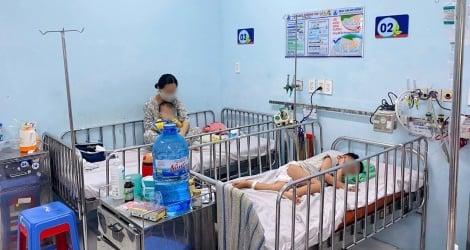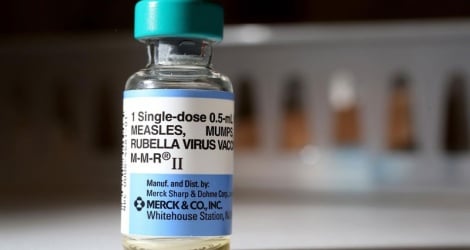CDC Hanoi updates the situation of dengue fever, measles, meningitis
On September 30, according to the Hanoi Center for Disease Control (CDC), the city recorded 279 cases of dengue fever last week. Patients were distributed in 30 districts, towns and cities.
Some districts recorded many patients such as: Ha Dong, Thach That, Dan Phuong, Nam Tu Liem, Thanh Oai, Thanh Xuan, Thuong Tin, Bac Tu Liem, Dong Da, Hoan Kiem, Phuc Tho. Accumulated from the beginning of 2024 to now, the City recorded 3,530 cases of dengue fever, down 77% compared to the same period in 2023.
 |
| Illustration photo. |
In addition, during the week, 18 more dengue fever outbreaks were recorded in 8 districts: Nam Tu Liem, Cau Giay, Dan Phuong, Hoang Mai, Gia Lam, Quoc Oai, Thach That, Thanh Oai (5 outbreaks less than the previous week). In 2024, the City recorded 183 outbreaks, of which 34 are currently active.
Hanoi CDC has coordinated with relevant units to organize monitoring, investigation, and epidemic handling activities in areas with cases and outbreaks.
Monitor dengue fever outbreaks in Quat Dong, Thuong Tin; Khuong Dinh, Thanh Xuan; Minh Khai, Bac Tu Liem; Nhat Tan, Tay Ho; Hang Bot, Van Chuong, Dong Da; Tan Hoi, Dan Phuong.
In addition to dengue fever, according to the Hanoi Department of Health, the measles epidemic here is also complicated. The city has just recorded 7 more cases of measles, including 5 unvaccinated cases and 2 cases not fully vaccinated against measles.
Accumulated from the beginning of 2024 to now, Hanoi has recorded 13 measles cases; while in the same period last year there were no cases.
Faced with the recent increase in measles cases, the City Center for Disease Control (CDC) has requested the Health Centers of districts, towns and cities to strengthen monitoring of suspected measles rash fever cases.
At the same time, conduct epidemiological investigations, take samples for testing of 100% of suspected cases, organize zoning, and thoroughly handle areas with patients and outbreaks according to regulations.
In addition, the city CDC coordinates with relevant units, especially the Education sector, to review the measles vaccination history of all children aged 1 to 5 years old living in the city (to be completed in October 2024).
Based on the results of this review, prepare to organize additional vaccinations against measles-rubella (MR) for children from 1 to 5 years old who have not been fully vaccinated according to the direction of the Ministry of Health and the City People's Committee.
In Ho Chi Minh City, in the context of the complicated measles epidemic, the City is still accelerating to vaccinate. Specifically, on September 28, 2024, the City injected a total of 1,198 doses of measles vaccine at 182 injection points across the City. Thus, up to now, 98% of children aged 1-10 who have not yet received enough doses of measles vaccine have been vaccinated.
As of September 28, the total number of measles vaccinations in the city was 199,887. Of these, children aged 1-5 years old received 40,479 doses (91.94%), and children aged 6-10 years old received 146,551 doses (99.71%). The measles vaccination campaign achieved 98% of the plan.
The Ho Chi Minh City Department of Health requested that the People's Committees of districts that have not reached the 95% rate need to speed up the progress to achieve the campaign's goals; for districts that have reached the rate of 95% or more, they need to maintain updates on the situation of mobile children to avoid missing unvaccinated children in the area.
Previously, after announcing a measles epidemic in the area, Ho Chi Minh City launched a campaign to vaccinate children against measles at the end of August 2024 with the aim of enhancing community immunity and preventing measles epidemics.
Another epidemic that has been complicated recently is meningitis caused by the Enterovirus virus. Recently, Hanoi Medical University Hospital has received and treated many children hospitalized due to headaches, vomiting and fever caused by meningitis caused by the Enterovirus virus.
According to Dr. Ngo Thi Huyen Trang, Department of Pediatrics, Hanoi Medical University Hospital, viral meningitis occurs year-round, but is most common in summer and fall.
In particular, Enterovirus (EV) is a family of many viruses, some of which are very dangerous to humans and can cause epidemics.
Enteroviruses are transmitted through two routes: fecal-oral and respiratory. The virus replicates in the primary organ (respiratory and digestive tract mucosa) and enters the blood, then to the reticuloendothelial organs (liver, spleen, lymph nodes).
Here, if immune measures fail to stop the virus from multiplying, the virus then re-enters the bloodstream and causes damage to target organs including the brain and meninges. In fact, the signs and symptoms of EV meningitis can be similar to some other diseases, so it can be misdiagnosed.
Children with meningitis have headache as the main symptom, which may also be accompanied by nausea, vomiting and mild fever. Some children have additional symptoms typical of EV infection such as localized blisters or a generalized rash, but this is rare.
To confirm the diagnosis, the patient needs to have a lumbar puncture and PCR testing to detect the virus. Symptomatic treatment is currently the mainstay of management of EV meningitis with analgesics, antipyretics, and anti-inflammatory drugs.
Dr. Ngo Thi Huyen Trang recommends that currently there is no specific medicine or vaccine to treat the disease, so preventive measures are very important to protect your baby's health.
Specifically, wash your hands and feet with soap before eating, after using the toilet, after coughing or sneezing. This applies not only to children but also to those who care for them.
Practice good food hygiene, eat cooked food and drink boiled water, use clean food with clear origin. Clean and disinfect shared toys daily after each play session.
Keep your living space clean, disinfect frequently touched surfaces such as doorknobs, tables, and chairs to prevent the spread of the virus and go to the nearest medical facility immediately when you have signs of illness to be diagnosed and treated promptly by a doctor.
Source: https://baodautu.vn/cdc-ha-noi-cap-nhat-tinh-hinh-dich-sot-xuat-huyet-soi-viem-mang-nao-d226236.html



![[Photo] President Luong Cuong and the King of Belgium witness the Vietnam-Belgium document exchange ceremony](https://vstatic.vietnam.vn/vietnam/resource/IMAGE/2025/4/1/df43237b0d2d4f1997892fe485bd05a2)
![[Photo] National Assembly Chairman Tran Thanh Man meets with King Philippe of Belgium](https://vstatic.vietnam.vn/vietnam/resource/IMAGE/2025/4/1/c6fb3ef1d4504726a738406fb7e6273f)
![[Photo] Official welcoming ceremony for the King and Queen of the Kingdom of Belgium](https://vstatic.vietnam.vn/vietnam/resource/IMAGE/2025/4/1/9e1e23e54fad482aa7680fa5d11a1480)
![[Photo] Queen of the Kingdom of Belgium and the wife of President Luong Cuong visit Uncle Ho's Stilt House](https://vstatic.vietnam.vn/vietnam/resource/IMAGE/2025/4/1/9752eee556e54ac481c172c1130520cd)
![[Photo] President Luong Cuong meets with King Philippe of Belgium](https://vstatic.vietnam.vn/vietnam/resource/IMAGE/2025/4/1/1ce6351a31734a1a833f595a89648faf)


























































































Comment (0)